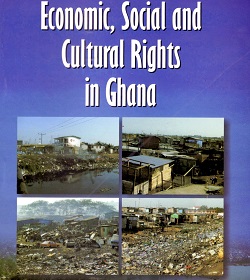 Until recently, the focus of human rights practice in Ghana has largely been on civil and political rights. While the political and constitutional environment has expanded with promulgation of the 1992 Constitution (which formally incorporates a bill of rights), a number of factors militate against the request for the realization of the respect, protection and promotion of basic rights and freedoms.
Until recently, the focus of human rights practice in Ghana has largely been on civil and political rights. While the political and constitutional environment has expanded with promulgation of the 1992 Constitution (which formally incorporates a bill of rights), a number of factors militate against the request for the realization of the respect, protection and promotion of basic rights and freedoms.
First, despite the relatively improved political and constitutional environment, the economic circumstances of many citizens, especially the rural and urban poor, remain dire, to the point of constituting a veritable violation of the right to live in dignity. Market liberalization under structural adjustment schemes has substantially shortened the arm of the state in the provision of basic social services including water, housing, education and health. The obligation of the state to respect, fulfill, and protect economic, cultural and social rights has thus been greatly affected, as the state appears to have been significantly constrained in terms of making adequate budgetary allocations towards the realization of these rights.
Second, until human rights NGO’s, especially the Center for Public Interest Law (CEPIL), took up strategic public interest litigation in the area of economic and social rights, the legal landscape on economic and social rights in Ghana had remained completely unexplored, in contradistinction to litigation in the area of civil and political rights.
Third, there seems to be an unhappy gap between recognized rights and remedies-in the sense that rights violations do not receive adequate remedy. This may be attributed to a number of factors, including but not limited to lack of awareness and/or poor legal skills among judges and the legal profession; inadequate knowledge and/or legal expertise in the area of strategic public interest litigation of economic and social rights and the unavailability of funds for litigation in these areas.










































